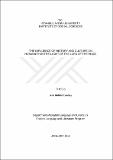DSpace Repository
THE INFLUENCE OF HISTORY AND CULTURE ON HUMANITY IN THE LIGHT OF THE LORD OF THE RINGS
JavaScript is disabled for your browser. Some features of this site may not work without it.
| dc.contributor.author | Bülbül Candaş, Aslı
|
|
| dc.date.accessioned | 2019-05-22T10:44:55Z | |
| dc.date.available | 2019-05-22T10:44:55Z | |
| dc.date.issued | 2016 | |
| dc.identifier.uri | http://hdl.handle.net/11547/2012 | |
| dc.description.abstract | Tez, tarih ve kültür konularının insanlık üzerinde büyük bir etkisi olduğunu, ve tarihten destek alan, kültürün ana üretim alanlarından biri olan edebiyatın savaş sonrası dönemlerde insanlık için örnek teşkil eden en önemli aracı olduğunu tartışmaktadır. Bu fikre bir örnek olarak John Ronald Reuel Tolkien’in Orta Dünya destanı The Lord of the Rings, Goethe hümanizmi, yeni tarihselcilik, çok kültürlülük ve bireysellik açılarından ayrıntılı olarak incelenmektedir. İlk bölümde, destanın ilk romanı olan The Fellowship of the Ring, kültürel çeşitliliğin, çokkültürlü bir grubun, ve kişinin kendi kültürünü öğrenmesinin yararları açısından incelenmektedir. Tez, İkinci Dünya Savaşı’nın ardından barışın yalnızca kültür teması üzerinde çalışarak, farklı kültürlere hoşgörülü olarak ve onlarla aynı dünyayı paylaşmayı öğrenerek getirilebildiği fikrini okura sunmaktadır. İkinci bölümde, destanın ikinci romanı olan The Two Towers, çokkültürlü grubun içinde bireyselliğin, ve gruptaki diğer kültürler ve kültürel mirasın düşmanının kişiliği hakkında öğrenmenin önemi açısından incelenmektedir. Bu bölüm, barışçıl bir dünyanın kurulmasında kültürle ilgili gerekli bilgilerin ne ölçüde rol oynadığını soruşturmaktadır. Üçüncü bölümde, destanın üçüncü ve son romanı olan The Return of the King, insan ilişkilerinde doğru iletişim sayesinde ektiğini biçmek, kültürel tarihi birlikte savunmak ve savaşın yönleri açısından incelenmektedir. Kazanılan fikir ve izlenim, ötekinin hayatını onurlandırmanın kişiyi insan yaptığı ve kişinin kendi hatasını kabulünün de onu eşsiz yaptığıdır. Bu çalışma, edebiyatın kaynağının kültürel tarih olduğuna ve edebiyatın insanların geçmiş deneyimlerini, acılarını ve geçmişten çıkardıkları dersleri içerdiğine işaret eder. Okurlar, savaş sonrası dönemlerden edebi eserler okuyarak ve onları kendilerine özgü biçimlerde yorumlayarak bu eserleri örnek alma yoluyla dünyayı değiştirecek yetkiye sahip olurlar. | tr_TR |
| dc.language.iso | tr | tr_TR |
| dc.publisher | ISTANBUL AYDIN UNIVERSITY INSTITUTE OF SOCIAL SCIENCES | tr_TR |
| dc.subject | Hümanizm | tr_TR |
| dc.subject | Yeni Tarihselcilik | tr_TR |
| dc.subject | Çokkültürlülük | tr_TR |
| dc.subject | Bireysellik | tr_TR |
| dc.subject | Edebiyatta Dünya Savaşları | tr_TR |
| dc.subject | Humanism | tr_TR |
| dc.subject | New Historicism | tr_TR |
| dc.subject | Multiculturalism | tr_TR |
| dc.subject | Individuality | tr_TR |
| dc.subject | World Wars in Literature | tr_TR |
| dc.title | THE INFLUENCE OF HISTORY AND CULTURE ON HUMANITY IN THE LIGHT OF THE LORD OF THE RINGS | tr_TR |
| dc.type | Thesis | tr_TR |
| dc.description.abstractol | The thesis discusses that the themes of history and culture have a great influence on humanity, and literature, as an area taking support from history and being a main production field of culture, is the most significant mediator to set the pace for humanity in postwar periods. As the example for this idea, John Ronald Reuel Tolkien’s Middle-earth saga, The Lord of the Rings, is examined in detail in consideration of Goethean humanism, new historicism, multiculturalism and individuality. In the first part, The Fellowship of the Ring, the first novel of the saga is examined in terms of the benefits of cultural diversity, a multicultural group, and learning one’s own culture. The thesis provides the reader with the idea that after World War II, peace could be brought only by studying on the theme of culture, showing tolerance to different cultures and learning to share the same world with them. In the second part, The Two Towers, the second novel of the saga is examined in terms of the importance of individuality in the multicultural group, learning about other cultures in the group and the characteristics of cultural heritage’s enemy. This part investigates to what extent background information for culture played a role in building a peaceful world. In the third part, The Return of the King, the third and last novel of the saga is examined in terms of reaping the harvest of true communication in human relations, defending cultural history together and the aspects of war. The idea and impression gained are that dignifying life of the other makes one human and accepting one’s mistake makes human unique. This study implies that literature gets its source from cultural history and includes people’s past experiences, sufferings and lessons that they have taken from the past. By reading works of literature from the postwar periods and interpreting them on their own ways, readers have the authority to change the world by taking the works as example. | tr_TR |
| dc.publisher.firstpagenumber | 1 | tr_TR |
| dc.publisher.lastpagenumber | 71 | tr_TR |
Files in this item
This item appears in the following Collection(s)
-
Tezler -- Thesis [3470]
